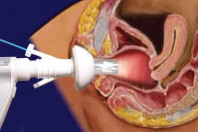
Photo from wikipedia
BACKGROUND The use of nonpharmacological modalities in managing symptoms experienced by patients with cancer is increasingly important in providing holistic care. However, limited studies have reported on integrating nonpharmacological interventions… Click to show full abstract
BACKGROUND The use of nonpharmacological modalities in managing symptoms experienced by patients with cancer is increasingly important in providing holistic care. However, limited studies have reported on integrating nonpharmacological interventions to improve physical and psychological symptoms of women with gynecological cancer. OBJECTIVE The aim of this study was to examine the effect of a multimodal nursing intervention (MNI) on sleep quality, fatigue, and level of depression among Indonesian women with gynecological cancer. METHODS The quasi-experimental nonequivalent group design involved 50 patients in 2 groups and used convenience sampling. An experimental group (n = 25) received MNI including progressive muscle relaxation and a counseling session; the control group received routine hospital care (n = 25). Sleep quality was assessed by the Pittsburgh Sleep Quality Index (PSQI), depression levels by the Beck Depression Inventory-II, and fatigue by the Piper Fatigue Scale (PFS). Pretest data were collected after 3 days of hospital admission; posttest data were gathered after the intervention. RESULTS The PSQI (P = .000), Beck Depression Inventory-II (P = .008), and PFS (P = .000) changed significantly in the intervention group; the PSQI (P = .000) and PFS (P = .000) in the control group changed significantly. The PSQI (P = .00) and PFS (P = .000) scores differed significantly between the 2 groups before and after the intervention. The effect size of the MNI for difference scores before and after the intervention was medium effect size. CONCLUSIONS The role of nonpharmacological modalities in managing symptoms experienced by patients with cancer is increasingly important to providing holistic care. IMPLICATION FOR PRACTICE Gynecology nurses can lead the implementation of MNI to decrease patient fatigue and depression and to increase sleep quality.
Journal Title: Cancer nursing
Year Published: 2022
Link to full text (if available)
Share on Social Media: Sign Up to like & get
recommendations!